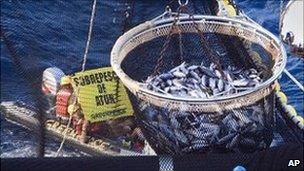Pacific fishing: Tuna and other stocks 'at risk'
- Published

The Pacific's last sustainable fishing areas are under threat, says New Zealand
New Zealand has called on the United States and Australia for help in saving one of the world's last sustainable fishing areas, the Pacific.
Foreign Minister Murray McCully said time was running out.
He said new, concerted efforts were needed to stop illegal fishing which was endangering tuna and other fish stocks.
New Zealand is the largest provider of aerial surveillance of Pacific Island economic exclusion zones.
The US Coast Guard is a strong contributor to that work, but Mr McCully said more surveillance would make a big difference.
Speaking at the US-NZ Partnership Forum in Christchurch, Mr McCully said more than $300m (£184m) worth of fish was being stolen every year.
"I believe the time has come for New Zealand, the US and Australia to dramatically step up our collective surveillance activity in the region to provide a comprehensive assault on illegal activity," he said.
He described the Pacific as "the last major fishery on the planet that has not been exploited beyond the point of sustainability".
"(We) have a major responsibility to our neighbours to ensure that sustainable management practises are put in place soon," he said.
"We are fast running out of time."
An estimated $1.5bn (£940m) in legitimate fishing takes place each year in economic zones declared by Pacific states, but those states are unable to conduct the amount of surveillance necessary to protect the resource.
The inroads made by poachers into lucrative tuna grounds were particularly damaging to Pacific communities, Mr McCully said, some of which were "facing sub-Saharan levels of poverty".
A report last year warned that fish stocks in the Pacific could collapse by 2035 unless steps were taken to address overfishing, population growth and climate change.
- Published5 January 2011
- Published26 October 2010